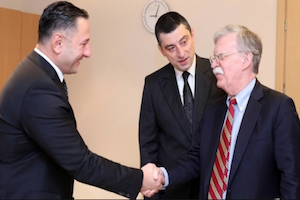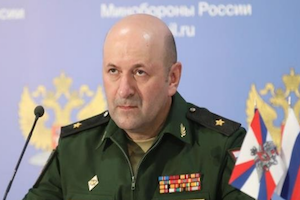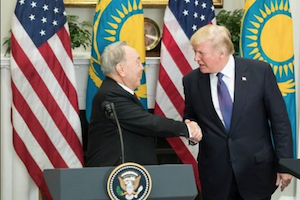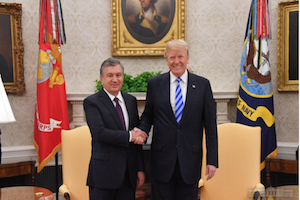Bolton's Caucasian Tour and Russia's Reaction
By Eduard Abrahamyan
December 17, 2018, the CACI Analyst
On October 24-26, a U.S. State Department delegation headed by National Security Adviser Ambassador John Bolton visited the South Caucasian republics after talks in Moscow. The delegation’s visit to Azerbaijan, Armenia and Georgia was immediately dubbed a reinvigoration of U.S. policy towards the Caucasus and a pragmatic reengagement with the conflicted region. Bolton appeared to refine the evolving U.S. priorities with each country, categorizing them in accordance with political capabilities, shared interests and the roles that Georgia, Azerbaijan and Armenia respectively seek in relations with the West. The visit, however, caused an angry reaction from Moscow, especially given the issues Bolton raised in Yerevan.

Russa's "Biological" Information Operation Against the US and Georgia
By Nurlan Aliyev
November 27, 2018, the CACI Analyst
During a press conference in Moscow on October 4, 2018, Major General Igor Kirillov, commander of Russia’s radiological, chemical and biological defense troops, stated that 73 citizens of Georgia had died as a result of medical experiments conducted by a company owned by former U.S. Secretary of Defense Donald Rumsfeld. He referred to recent accusations from Georgia’s former Minister of State Security Igor Giorgadze, who served in the KGB from the 1970s to the 1990s and holds the title “Honorary Officer of the KGB of the USSR.” Kirillov’s statement coincided with allegations from the UK and the Netherlands that Russian spies attempted to hack the Organisation for the Prohibition of Chemical Weapons (OPCW) in The Hague.

Towards a Central Asia and Caucasus Trade Bloc for Belt and Road
By Tristan Kenderdine
October 30, 2018, the CACI Analyst
In the trade war with the U.S., China has clearly shown that it is willing to reject Pacific trade partners based on political over economic considerations. Beijing’s wider policy to develop industrial and agroindustrial capacity in Central Asia, the Caucasus and the Middle East means that these economies can use short-term structural changes in global trade dynamics to their longer term advantage. Ultimately, all states suffer in a trade war. If Central Asian, U.S. and European producers all had open access to China’s markets, all sides would benefit in the long run. In the short term though, a U.S.-China trade war is a huge opportunity for Central Asian economies to soak up China’s heavy industry outward direct investment despite the risk of a China policy bank debt-trap.

U.S.-Kazakhstan Transit Agreement Faces Challenges From Russia
By Nurlan Aliyev
September 20, 2018, the CACI Analyst
During the Collective Security Treaty Organization (CSTO) foreign ministers’ meeting in Almaty on June 11, 2018, Russia’s Foreign Minister Sergey Lavrov informed his Kazakh counterpart of Moscow’s concerns over U.S. military logistics planning involving Kazakhstan, and biological laboratories in the country. The protest was prompted by President Nursultan Nazarbayev’s signature on May 5 of amendments to the 2010 U.S.-Kazakhstan agreement on commercial rail transit of special cargo to Afghanistan through Kazakhstan, which allow the U.S. to use Kazakhstan’s territory for supplying U.S. forces in Afghanistan. The exchange took place on the eve of the fifth Caspian summit, where the heads of the five littoral states signed a convention on the status of the Caspian Sea, according to which non-littoral states may not deploy armed forces to the Sea.

Taking the U.S.-Uzbekistan Relationship to the Next Level: Mirziyoyev's Historic Visit
By Sanjar Valiyev
June 11, 2018, the CACI Analyst
President Shavkat Mirziyoyev’s visit to Washington was historic, being the first official visit of an Uzbek president since 2002. Mirziyoyev’s reception, and the breadth and width of agreements signed, constitute an acknowledgement of the reform process in Uzbekistan, as well as of the country’s newfound regional role and in particular its constructive approach to resolving the problem of Afghanistan. Washington’s engagement in these efforts will further improve the prospects of success in Uzbekistan’s domestic reforms and regional initiatives.



